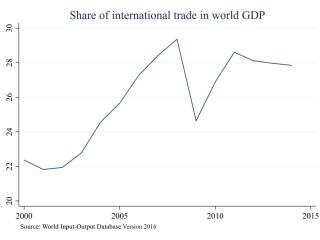Results for tag: Press
Peak trade?
The (Dutch) Financieel Dagblad reports on new GGDC research: An Anatomy of the Global Trade Slowdown based on the WIOD 2016 Release. This paper is based on the newly released WIOD data and analyses why global trade has not grown as rapidly since 2008 as...
NY Times: 70 million Chinese jobs from trade
The New York Times Magazine picked up research by Bart Los, Marcel Timmer and Gaaitzen de Vries: "Last year, economists at the University of Groningen, in the Netherlands, said that by their very rough estimates total foreign demand for Chinese goods may...
Vietnam as the next China?
The Economist uses data from the Penn World Table to illustrate how Vietnam's growth in GDP per capita over de past quarter century matches China's growth experience following its liberalizing reforms in the late 1970s.
Guardian: Brexit would divide Britain
The Guardian has written about the report by Bart Los and others on regional support for Brexit and dependence on the EU.
Brexit and EU dependence
Ahead of Britain's referendum on EU membership, Bart Los has co-authored a study with Philip McCann, John Springford, and Mark Thissen.
Robert Inklaar wins WF Duisenberg Fellowship Prize
Robert Inklaar has won the WF Duisenberg Fellowship Prize, awarded every two years to the best young applied macroeconomist in the Netherlands. The jury praised his publication record and contribution to policy debates. On receiving the prize, he discussed...
Insight in Exports
Marcel Timmer discusses in an interview in Het Financieel Dagblad (in Dutch) how improved data collection and analysis leads to greater insights in the export performance of countries. Important insights relate to the interconnectedness of manufacturing...
Productivity conference covered
ABC espana, amongst other Spanish media, covered the main highlights of the fourth World KLEMS conference. This conference was organised by IVIE in cooperation with Harvard University and the GGDC.
The cost of Brexit
A recent study, by CEPR and LSE, shows that if Britain leaves the European Union, the costs in terms of lower living standards would be substantial. The economic model that was used relies on the data of the World Input-Output Database.





